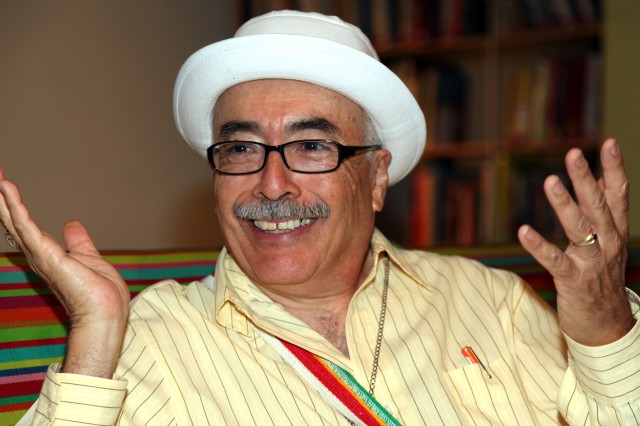
Juan Felipe Herrera is California’s poet laureate and a professor at UC Riverside, but he’s also been a performance artist, a children’s book author, a novelist, and an activist. Before talking about his life and work, he spun stories in the Zócalo green room about making art out of embarrassment, hearing (and telling) great jokes, and unlikely venues for poetry and performance art.
Q. What embarrasses you?
A. In a way I’ve been working through that whole thing of embarrassment from day one. The first time I went to school I spoke Spanish only, so it was such a shock to be punished on day one for speaking in the language that I sang in. From thereon I was embarrassed, speaking Spanish, so from thereon my challenge-almost my life challenge-was to break through that. … In life, things like embarrassment dissolve. And in art, you can use them. They become kind of like tools or palettes or themes. But I found that out after four decades.
Q. What was the first poem you memorized?
A. Probably poems that my mother knew from her childhood-Mexican ballads of the borderlands. I sang them from when I was four years old, and when I got my guitar when I was 16 I’d sing them together with her.
Q. Who told the last great joke you heard?
A. That’s kind of a rare thing. It probably was my first joke, because that’s the only one I remember. Growing up, my parents’ tradition is a storytelling tradition, farmworkers’ storytelling, so they’re not really jokes. It’s more like a story that has something funny in it that then you can say was a joke. In English it feels like a strict category. In Spanish a chiste is more like a part of a story. The first joke was a story, a humorous story: “The Bald Man, the Runny Nose Man, and the Itching Man.”
Q. If you didn’t live in California, where would you be?
A. I would be in San Francisco. Mexico City’s not bad, I could be in Mexico City. I could be in a little village somewhere. I could be with my sisters, my 84-year-old sister Sarah and my 91-year-old sister Concha in Mesquite, New Mexico. I think I would be there. It’s very hot though.
Q. What’s the most unlikely place you’ve ever performed?
A. All of them are unlikely. I’ve performed in bars, in the Reno Club in Sacramento where 2 percent [of the audience] may be listening to you. I performed in Mexico City where the performers throw bottles of beers at the audience. You name it, I performed there. On soapboxes on the Mission Street. The Keystone Club in San Francisco, that was closed down. Tobacco collectives in Northern Veracruz, Mexico. …
Q. Where would we find you at 10:00 on a typical Saturday morning?
A. Finally facing my cluttered kitchen writing desk trying to figure out what to do. Figuring out things I want to write but can’t get to becuase I get too many emails. That’s after I walk my dog and everything.
Q. What historical figure would you most like to meet?
A. Let’s go with a cultural core figure. I would go with Hungry Coyote, Nezahualcoyotl, one of the first major poets of the Americas, an Aztec elder poet. I’d meet the Aztec priest who asked Cortés to stand before the Spanish military leaders and make an agreement to submit. Frida Kahlo would be great, she’d be really feisty, she’d be smoking cigarettes. It’d be great to talk to Gandhi. … They’re all fabulous. That’s just a sampler. There’d be many more.
Q. What word or phrase do you use most often?
A. Probably cilantro. I talk about a billion other things but I really use the word cilantro quite a bit when I speak to children, and anybody really, because when I say that word the whole room comes tumbling down into squeals, roars, sobs, and utter protestations of joy.
Q. What’s the best advice you’ve ever been given?
A. Be kind. Nice and easy-it isn’t that easy.
Q. What about L.A. has changed the most since you were a student at UCLA?
A. Maybe it’s me. I think everything has changed about L.A. I used to hang out at the Ash Grove, I used to go see Taj Mahal before he even cut the Natch’l Blues album, when he was just playing the songs he ended up recording. Richie Havens used to play there when he was just coming into his own. So that’s all gone. Or Venice. I moved into Venice in mid-1969, and it was just a smoky little beach ranch with the canals, and everything was afloat, a couple of boutiques were going up, and maybe one organic food store. So that’s all gone. It went through this boutique era and now it’s something else.
*Photo by Aaron Salcido.



